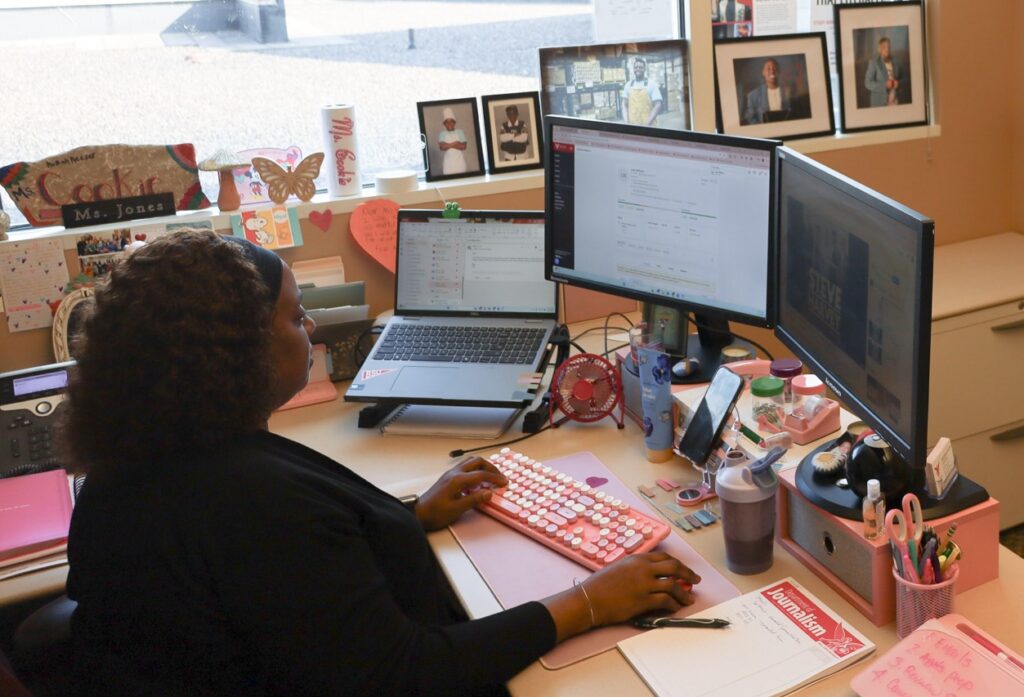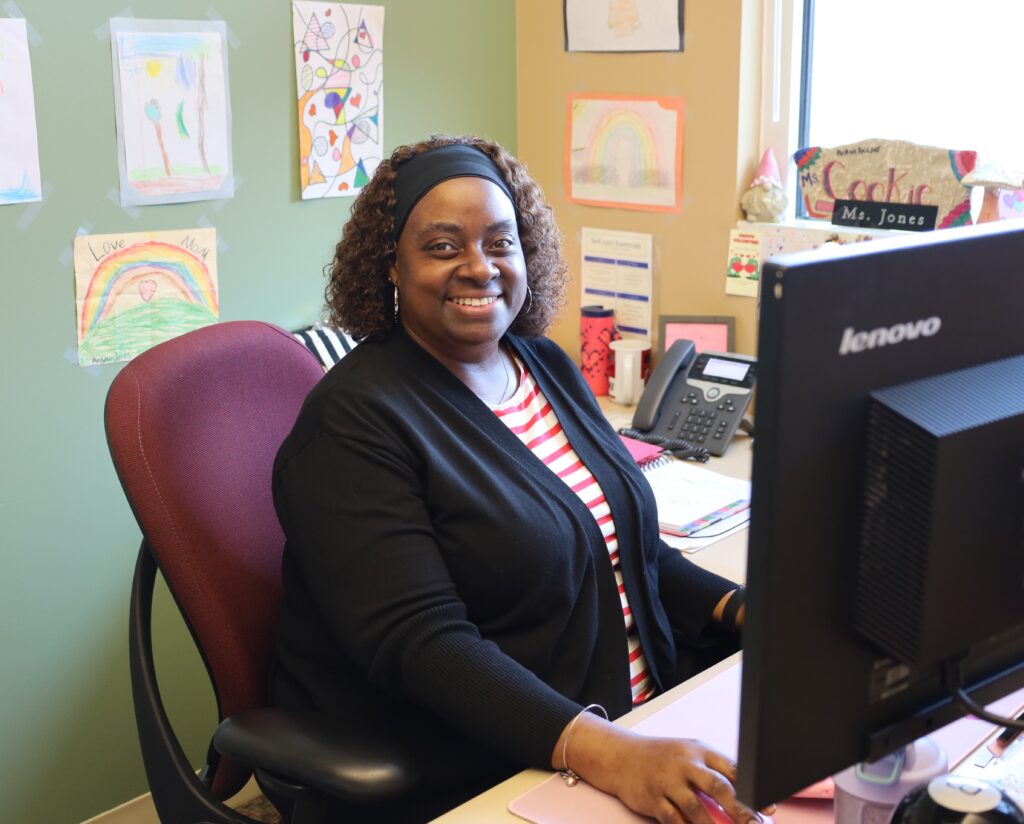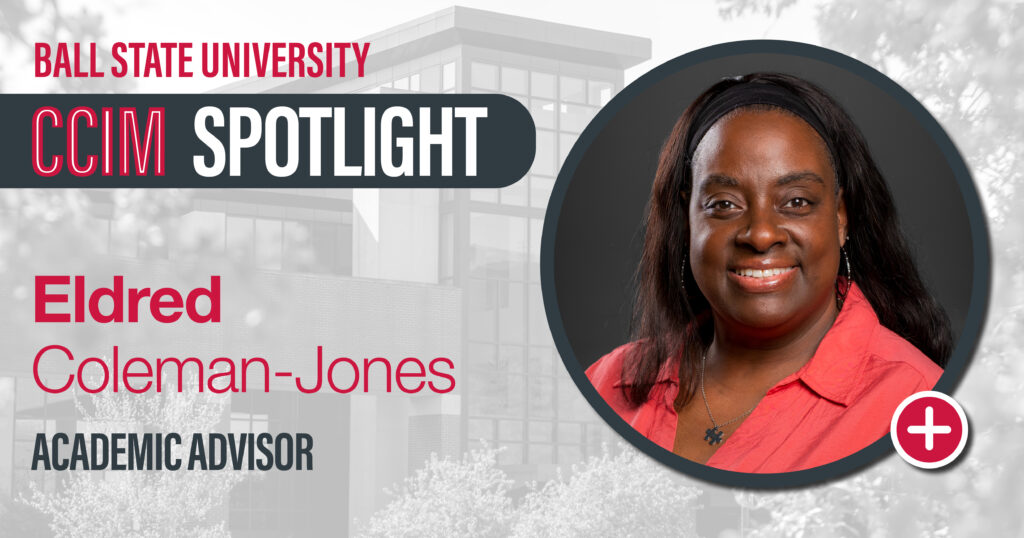Meet Eldred Coleman-Jones, the newest Undergraduate Academic Advisor in CCIM’s School of Journalism and Strategic Communication (SJSC)!
Coleman-Jones, also known as Ms. Cookie, is a Ball State ’93 alumna who completed her undergraduate degree in the Department of Political Science and the Department of Criminal Justice and Criminology. Now, she is settling happily into the College of Communication, Information, and Media as an academic advisor.
Coleman-Jones sat down with CCIM Outreach Office Graduate Assistant Keith Rinker (Department of Media, ’26) to discuss her career, goals for SJSC students, and her Ball State experiences!
How did you end up at Ball State?
I started out at Ball State — I graduated in ’93 with a degree in political science and criminal justice and then worked at a law office for about 20 years. I got married, had and raised some kids, ended up going back to school to get my masters in 2018 and worked here in the community at an elementary school as a behavior coach.
Helping students became a passion of mine. I mean, I’ve always been helpful; I’ve loved helping people, but pouring into young people became a real passion of mine especially as I was raising my kids.
I always was keeping track of jobs available at Ball State, and when the opportunity presented itself, I went ahead and applied. It’s a passion of mine to pour into college students.
What about Ball State stands out to you?
For me, it goes back to when I was a student. [What stood out] was always the concern and care that I received from the professors, and now in this role I see that.
During our onboarding, we are encouraged to really reach out and care about the students. They’re humans, we have to look at the human side first and then get to what’s going on academically. So, I think it’s always been the care and concern that I received as a student and now I get to do that too.
Is there anything in particular that stands out to you about CCIM students?
In the students that I’ve come across in meetings, the enthusiasm for the major that I’ve seen in some of them and just all the technology [is what stands out]. This is completely out of my wheelhouse but learning the lingo of the different majors and of the different classes has been just phenomenal, and I’m amazed by what media is doing now.

Is there anything that can be particularly challenging about your job?
Sometimes connecting with people is the hardest thing, but you have to find that common ground and let them know, “I’m on your team; I’m not against you; I’m not your parent; I’m not trying to discipline you.”
What would you say is the most rewarding part of your job?
When I see [in students’] faces that they’re doing well, especially the students that may have been struggling in past semesters. To see them finally either get their grade point average up a few points or up to a point where, you know, they’ve met their goal. Just to see them really enjoying their classes. For some of them, that means withdrawing from classes and then you see that weight lifted off of them it’s like, “Okay I can finish now.” I think, as they reach their goals — that’s definitely, definitely it.
Do you have any specific goals in working with the students you advise here?
[I want them to] find their niche — and hopefully with the plans they’re on or the track that they’re on, [even if] there needs to be adjustments, they’ll find their sweet spot. Sometimes it takes a little bit of maneuvering to [find your passion], and I think that’s my main goal is to help them get there.
So, you listen, and you pay attention to what they’re saying, you look at the history of their semesters and see how they’ve been doing, what classes they’ve done well in, what classes they’ve struggled in, and just kind of see, is this the path that you’re on that you really want to be on.
Do your experiences from your undergraduate degree help you guide students today?
Yes, because I can show them that you can hit rough spots, but you don’t have to stay there. My inspiration was that disappointing look on my mother’s face when I took her my grades. I think being transparent and letting students know I was there too is helpful.
If you’re on academic probation or close to suspension, you can come up from that. I just had to dig in, and I had to say no to a lot of stuff too. It’s important to let them know it’s not a road paved with roses, there’s going to be some thorns and you’re going to have to navigate those, but you can do it. I’m an example that you can hit some bumps, you weather those storms, but you can do it.
When you see your younger self in a student, how do you approach helping them?
I would listen. I was where they are, it was eons ago but it was still the same circumstances. They can overcome this, and it’s just kind of about reassuring them and that’s where being transparent, not being afraid to open up and say who you were and what you went through makes a difference.
I think that’s a lot of the problem — too many people just want to stay closed up. They don’t want to open up and share about things; heaven forbid I tell you I was on academic probation! Just listening to what students are saying and things that are maybe tripping them up, you might find that it may not have to do with their classes at all. It’s just taking the time to listen and to understand.

Do you have any advice for current Ball State students?
Just keep aiming for the stars! Don’t let things happening around you, circumstances, things going on in our world — don’t let any of that stuff stop you. If your pathway looks a little lumpy right now it’s okay, you can do it. You’ve got support, you’ve got your family, your community, and here on campus you’ve got the advisors. We’re here to support you so don’t ever get to a point where you feel like you can’t do it.
Is there anything else you want others at Ball State, especially students, to know about you?
I’m just me. If you need to come and just talk to someone, you don’t have to be in my department, you can come have a chit- chat. I have tea, I have coffee, come sit and have a chat if you just need time to decompress, if you need a safe space — I’m that safe space, no matter what.
Interview by Keith Rinker (Department of Media, ’23 & ’26)
Blog by Amelia Harker (Strategic Communication: Public Relations ’27)
Videos by Izek Hernandez B. (Media Production ’25)
